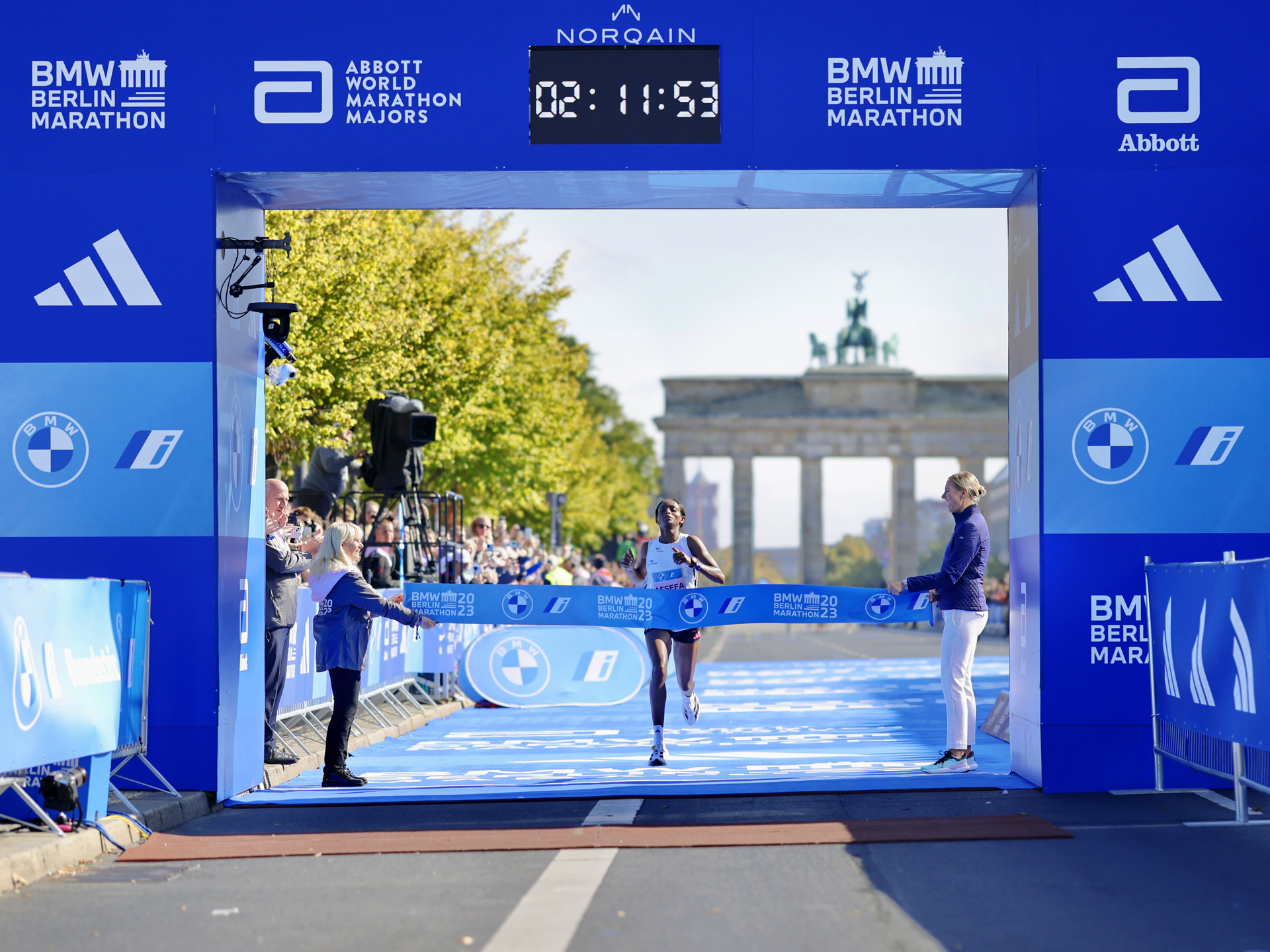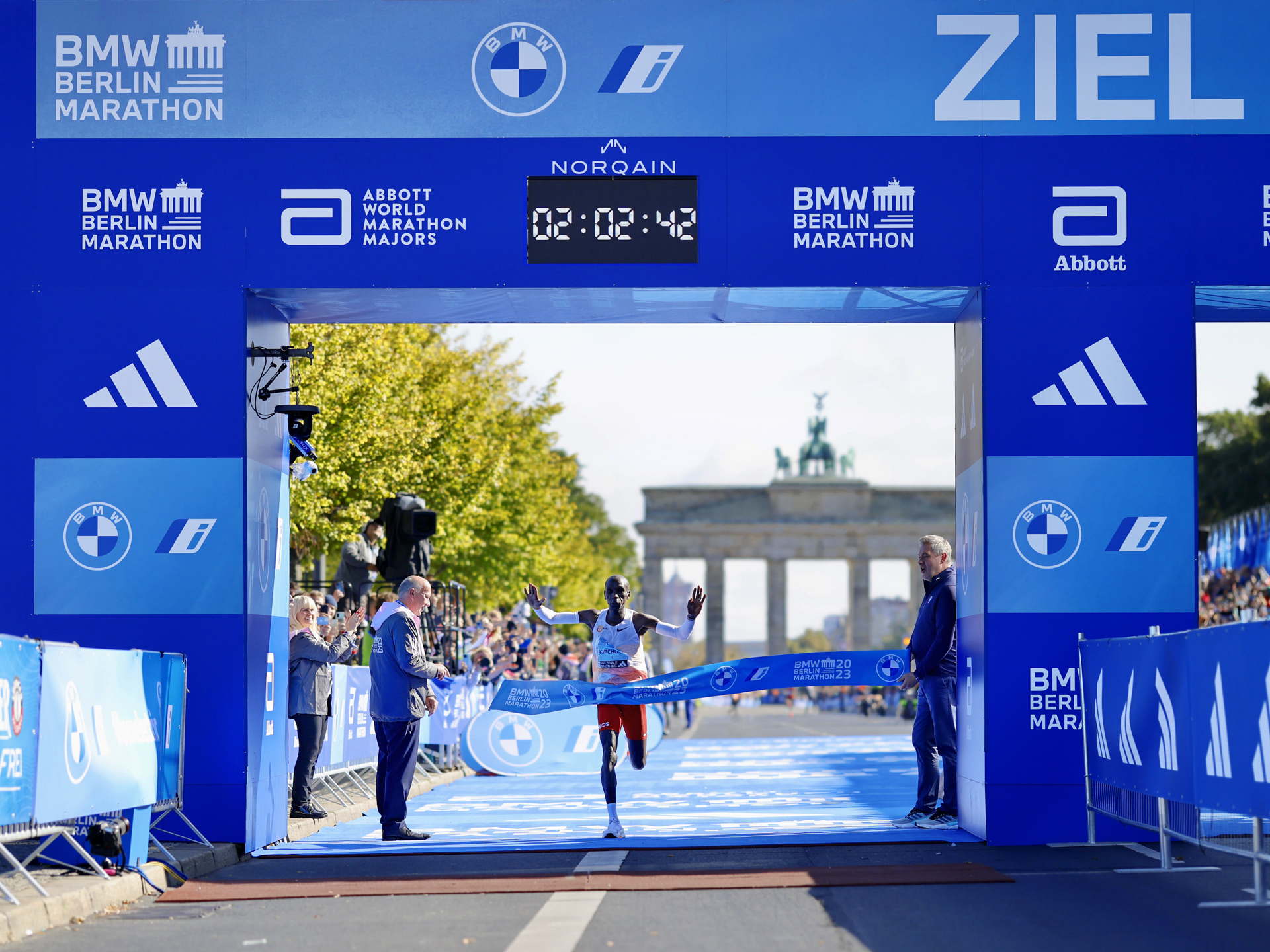- Fantastic world record for Tigst Assefa
- Eliud Kipchoge celebrates 5th victory at the BMW BERLIN-MARATHON
- World record also for racing wheelchair athletes
- Berlin celebrates the marathon
- Pics and News Clip available
A day for the history books. Tigst Assefa ran across the finishing line at the Brandenburg Gate after sensational 2:11:53 hours, setting a fantastic new world record at the BMW BERLIN-MARATHON. The 22-year-old Tigst Assefa was well below the world record time of Brigid Kosgei of Kenya, who had run a time of 2:14:04 in Chicago in 2019. The Ethiopian ran a time of historic sporting significance in Berlin.
Eliud Kipchoge became the record winner of the race. The Kenyan triumphed for the fifth time in Berlin, winning with a world-class time of 2:02:42 hours. Although the 38-year-old clearly missed his own world record of 2:01:09, he still achieved the eighth-best time ever run. Measured by the two winning times, the 49th BMW BERLIN-MARATHON was the fastest race ever over the classic distance. Added together, this results in a time of 4:14:35 hours. For the second time since 1999, the race in Berlin holds both marathon world records.
Amanal Petros breaks German record
Amanal Petros (Marathon Team Berlin) ran a sensational German record. The 28-year-old finished in ninth place after 2:04:58 and was the first German to break the 2:05 hour barrier.This time by Amanal Petros would have been a world record a good 20 years ago.It is the first German men's record in the history of the race, which began in 1974 at Grunewald.One year before the Olympic Games, Amanal Petros is on his way to catching up with the extended world elite.He is now the fourth-fastest European of all time and has even overtaken Britain's running superstar Mo Farah in that list. "I really enjoyed the atmosphere. The last two kilometres were wonderful, even though I was very tired. This race was very special. I was already expecting the time, although of course anything can happen in a marathon," said Amanal Petros. The fastest German woman in Berlin was Domenika Mayer (LG Telis Finanz Regensburg), who ran to 14th place with a personal best and a German best time of 2:23:47 for the year.
The women's race
The women's race had a sensational pace from the start. At the 10k point, 13 athletes in the first group were running on a world record course with an intermediate time of 31:45 minutes. Tigst Assefa ran so easily that she grabbed a water cup at the aid station at kilometre 15 and handed it to her pace makers. Shortly afterwards, she tore the lead group apart with a huge increase in pace. Tigst Assefa and Workenh Edeessa ran the 15-16k section together in 2:59 minutes. Workenh Edeessa then dropped back a few kilometres later and Assefa stormed over the half marathon mark in 66:20 - a time in that she would win many international races over this distance.
Even faster in the second half of the race
Tigst Assefa ran even faster in the second half of the race (65:33 min.) "In the first half I saved some energy for the second part," said Tigst Assefa, who could have won the men's race at the Berlin Marathon in the 80s. "I trained for six months for this race. Now I think I will be nominated for the Olympic Games”, said Assefa. Kenyan Sheila Chepkirui finished second in an excellent time of 2:17:49h. Magdalena Shaun finished surprising third, setting a record for Tanzania with 2:18:41. Eight women finished under 2:20:00 in Berlin.
Domenika Mayer was by far the fastest German woman at the BMW BERLIN-MARATHON. She led the national competitors early behind her and crossed the half marathon mark after 71:50 minutes. The 32-year-old was able to keep up this pace in the second half and finally improved her best time of 2:26:50 for more then three minutes to 2:23:47. Domenika Mayer currently has a good chance of an Olympic starting place in Paris 2024. Deborah Schöneborn finished 19th in 2:27:35 while her twin sister Rabea (both Marathon Team Berlin) abandoned the race.
The men's race
Eliud Kipchoge started the race with an extremely fast pace, led by three pace makers. The two-time Kenyan Olympic champion and world record holder - he had run 2:01:39 in Berlin in 2018, then 2:01:09 a year ago - crossed the half marathon mark after 60:21 minutes and was on course for a world record at this time. Surprisingly, Derseh Kindie, who had started with a best time of 2:08:23, ran next to him. The Ethiopian kept up for a long time, but then collapsed about 10 km before the finish and gave up. At that time, Eliud Kipchoge was no longer on course for the world record. The Kenyan could not keep up his pace this time.When the marathon debutant Vincent Kipkemboi (Kenya), who was running behind him, came closer, Eliud Kipchoge picked up the pace and won in 2:02:42. Kipkemboi was second in 2:03:13 ahead of another debutant, Tadese Takele (Ethiopia/2:03:24). "I missed the world record, but instead I am now the record winner in Berlin - that is also something special," said Eliud Kipchoge.
Nine men under 2:05 hours
With nine runners under 2:05:00 hours, the BMW BERLIN-MARATHON had an excellent breadth at the top. Ninth was Amanal Petros, who set a very ambitious pace from the start and ran the first half in 62:12 minutes. At kilometre 30, his intermediate time of 1:28:16 even pointed to a finishing time of around 2:04 hours, but in the last kilometres he could not quite keep up the fantastic pace. Nevertheless, he improved his best time from 2:06:27 to 2:04:58. Behind Amanal Petros, two other German athletes ran best times and stayed under 2:10 hours for the first time: Samuel Fitwi (Silvesterlauf Trier) finished 18th in 2:08:28, Hendrik Pfeiffer (TK Hannover) 20th in 2:08:48, but not quite enough for the Olympic standard of 2:08:10.
World record in the wheelchair competition
The women's racing wheelchair athletes will also go down in the history of the BMW BERLIN-MARATHON with a fantastic new world record today. Catherine Debrunner from Switzerland won in 1:34:16 hours, just ahead of Eden Rainbow Cooper (1:34:17 h/USA) and Manuela Schär (1:34:17 h/SUI). All three athletes were well below the previous world record time of Manuela Schär (1:35:42 h).
In the men's race Marcel Hug from Switzerland celebrated his 9th victory in Berlin, clearly distancing Daniel Romanchuk (1:30:16 h/USA) and David Weir (1:30:17 h/GBR). "I was able to move to the front after only six kilometres, after that it was a lonely race, but it was huge fun," Hug said at the finish.
Joseph Fritsch and Julia Dierkesmann win the handbikers' race
In the women's handbike competition, Berlin debutant Julia Dierkesmann (GER/1:17:51 h) won ahead of Katrin Möller (GER/1:17:52 h) and Meggie Gay (FRA/1:34:04 h). The men missed a new course record by only four seconds. Joseph Fritsch (FRA) won in 1:00:05 hours ahead of his team member Johan Quaile (1:00:09 h). Both had already broken away from the field immediately after the start. Vico Merklein from Berlin won the final sprint of the chasing pack in 1:08:46 hours and came in third



